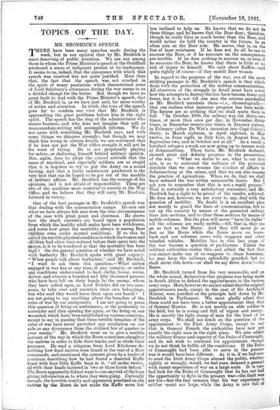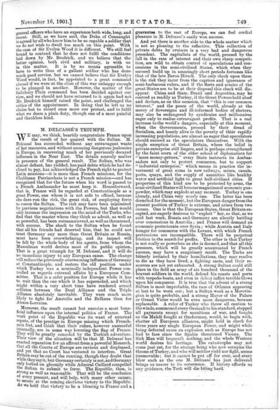TOPICS OF THE DAY.
MR. BRODRICK'S SPEECH.
THERE have been many speeches made during the week, but in our opinion that by Mr. Brodrick is most deserving of public attention. We are not among those in whom the Prime Minister's speech at the Guildhall awakened a. sense of indignant protest at its inadequacy. It seems to us, indeed, that the annoyance with which that was received was not quite justified. More than that, the fact that the • speech was not couched in the spirit of weary pessimism which characterised some of-Lord Salisbury's utterances during the war seems to us a decided change for the better. But though we have no great fault to find with the Prime Minister's speech, that of Mr. Brodrick is, as we have just said, far more worthy of notice and attention. In truth, the tone of the speech goes far to confirm our view that Mr. Brodrick is approaching the great problems before him in the right spirit. The speech has the ring of the administrator who means business, and who does not imagine that talk or memorandum-writing will accomplish reforms. We do not agree with everything Mr. Brodrick- says, and with some things we disagree strongly ; but though we may think him wrong in certain details, we are convinced that if 'he does not put the War Office straight it will not be for want of trying. He is • not perpetually playing for safety, or sheltering himself behind military, opinion. Igor, again; does he adopt the cynical attitude that the mass of mankind, and especially soldiers, are so stupid that it. is • hopeless to try to .put the Army on a sound fiioting, and that a fairly satisfactory patchwork is the very: best that caiebe hoped to be got out of the muddle of,, military ,affairs. Mr. .Brodrick has the courage of his oPinions. and is not afraid of responsibility. These are two of the qualities most, essential to success at the War Office, and- we believe that they will carry Mr. Brodrick forw-axd to victory.
One of the best passages in Mr. Brodrick's speech was that dealing with the concentration camps. He sets out what we have always felt sure were the true circumstances of the case with great point and clearness. He shows how the death statistics are based upon a population from Which the healthy adult males have been withdrawn, and notes how great the mortality always is among Boer clejldrein even •under, normal conditions. If to this be a4ded the terrible, physical-condition th which the women and cbildren 'had- often been reduced before their entry into the camps, is it to be wondered at that the mortality has been high ? On the general question of whether we have acted with barbarity Mr. Brodrick spoke with great cogency. " When people talk about barbarism," said Mr. Brodrick, "I want to ask them' this question,—What nation engaged in war has at any time, in any country, or under any conditions endeavoured to feed, clothe, house, nurse, doctor, and educate a hundred and fifty thousand persons who have been left on their hands by the enemy, whom they have called upon, as Lord Roberts did. on two occa- sions, to take over and maintain their own belongings, but who said they would leave them upon our, hands ? I am not going to say anything about the breaches of the rules of war by our antagonists. I am not going to press this question of firing on ambulances, or the professing to surrender and then opening fire again, or the firing on our wounded, which have been established on various occasions, except to say in passing that these terrible breaches of the rules of war have never provoked any retaliation on our side or any divergence from the civilised law of quarter to your enemy." Mr. Brodrick went on to give a terrible account of the way in which the Boers sometimes slaughter the natives in order to hide their tracks, and so elude their pursuers. He read a telegram from Lord Kitchener de- scribing how dead natives were found in the rear of a Boer commando, and mentioned the account given by a leader of .column describing how he had found a deserted Kaffir kraal with four little 'Kaffir boys in it, - " all under twelve, all with their heads battered in two or three hours before." The Boers apparently didnot want to run any. risk of theboys giving information as, to where they were going. Curiously enough, the horrible cruelty and oppression practised on the natives by the Boers do not make the lrm r more but less inclined to help us: He knows that we do- not do these things, and he knows that the Boer does ; therefore, though he really likes us much better than the Boer, and would rather we held the country in the future, he so often acts on the' Boer side. He moves, that is, on the line of least resistance. If he does not do all he can to succour the Boer, or if he succours us, the consequences are terrible. If he does nothing to succour us, or even if he succours the Boer, he knows that there is little or no risk of injury to himself. We only shoot Kaffirs—and quite rightly of course—if they molest Boer women.
In regard to the progress of the war, one of the most striking passages in Mr. Brodrick's speech is that which deals with the protection of the railway communications. All observers of the struggle in detail must have noted how the attempts to destroy the line have become fewer and fewer, but it is not till one sees the returns marshalled as Mr. Brodrick marshals them—i.e., chronologically— that one realises what immense progress has been made. The figures are so striking that we shall quote them in full. "In October, 1900, the railway was cut thirty-two times, or more than once per day, in November thirty times, in December twenty-one times, in January sixteen, in February (after De Wet's incursion into Cape Colony) thirty, in March eighteen, in April eighteen, in May twelve, in June eight, in July four, in August four; in September two, and in October not at' all." As a result a hundred refuge3s a week are now going up to resume work. at' Johannesburg. These facts, Mr. Brodrick declared, showed great and definite proeress in the prosecution of the war. " What we desire ato see, what is our. first aim, is so to surround the railways of the protected districts that we -can resume the conduct of affairs 'in Johannesburg at the mines, and that we can also resume the , practice of agriculture. When, we do that we shall have reduced the war within measurable limits. But I ask you to remember that this is not a rapid process." That is certainly a very satisfactory statement, and Mr. Brodrick has a right to' be proud of the results achieved. He does not, however; we are' sorry to, say, deal with the question of mobility. No doubt it is an excellent plan not merely to guard. the lines of communication, but to cut up the country by means of the protected railway lines into sections, and to clear these sections by means of mobile columns. But the plan will never " have its rights' till the columns are really mobile,—till, that is, they can go as fast as the Boers. And they will never go as fast as the Boers while the Boers move on horse- back and our columns move with waggons and other wheeled • vehicles. Mobility has in this last stage of the war become a question of packhorses. Unless the- military authorities realise this, and admit the fact that you cannot make use of ox-waggons to, chase horsemen, we may keep the railways splendidly guarded, but' we shall never ride down—or shall we say drive down?—the Boers.
Mr. Brochick turned from his very reasonable, and on the whole sound, declaration that progress was being made in South Africa to defend the appointments to the various army. corps Here, however, we cannot admit that the original appointments made, except in the case of Sir Archibald Hunter, were justified on the principle laid down by Mr. Brodrick in Parliament. We most gladly admit that there could not have been a better appointment than that of General. Hunter. He is not merely an able soldier in the field; but he is young and full of vigour and energy, He is exactly the right stamp of man for the head of an army corps. We shall not touch on the question of the appointment .to the First Army Corps, except to say that in General French the authorities have now got exactly the right man in the right place. We also admit the military fitness and capacity of the Duke of Connaught, and do not wish to condemn his appointment, though we do not think he fulfils all the conditions. If .the Duke of Connaught had been able to serve in the present war it would have been different. As it is, if we had ever to send. the Irish Army Corps abroad the public, whether rightly or wrongly, would, we -feel sure, demand a general with recent experience of war on a large scale. It is very bad luck for the Duke of Connaught that he has not had the opportunity to fight in the present war--the.fault was not bee-but the fact remains that, his war experience is neither recent nor large, while the Aimy is now full of general officers who have an experience both wide, long, and recent. Still, as we have said, the Duke of Connaught is agreed by allwho know him to be so capable a soldier that we do not wish to dwell too much on this point. With the case of Sir Evelyn Wood it is different. We still feel bound to contend that he does not fulfil the conditions laid down by Mr. Brodrick, and we believe that the better opinion, both civil and military, is with us in this _matter. It is by no means agreeable to have to write thus of a gallant, soldier who has done much good service, but we cannot believe that Sir Evelyn Wood would, in fact, be appointed to a great command abroad if we were at the close of this war unhappy enough to be plunged in another. However, the matter of the Salisbury Plain command has been decided against our view, and we should not have returned to it again had not Mr. Brodrick himself raised the point, and challenged the critics' of the appointment. In doing that he left us no choice but to record once more our protest, and to fulfil what we deem a plain duty, though one of a most painful and thankless kind.



























































 Previous page
Previous page